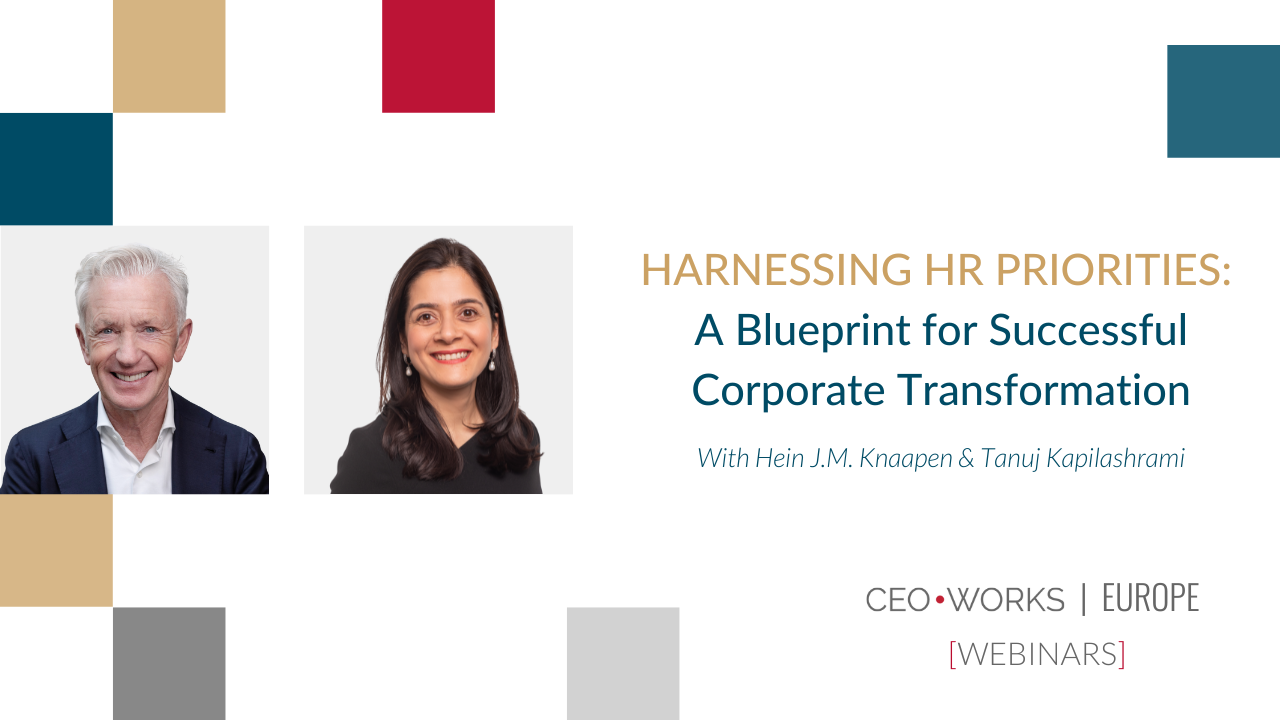As the global business landscape continues to evolve at an exponential rate, the role of Human Resources (HR) is transforming from traditional workforce management to driving strategic value. This blog post explores an insightful conversation between two HR visionaries - Hein J.M. Knaapen and Tanuj Kapilashrami - discussing the evolving role of HR in today's dynamic business world.
Knaapen, with over three decades of HR leadership experience and currently at CEOworks, and Kapilashrami, the Chief Human Resources Officer at Standard Chartered Bank, offer their extensive knowledge and perspectives on how HR can navigate and contribute to the complexities of modern businesses.
Business Challenges at Standard Chartered
Standard Chartered, a British multinational banking and financial services company, operates across diverse markets in Asia, Africa, and the Middle East. Its unique position in both Western economies and high-growth Eastern markets presents both challenges and opportunities that significantly influence HR strategies.
1. Maximizing Network Value: The bank leverages its geographical diversity to enhance trade and capital flows, thereby strengthening its corporate and institutional banking and developing retail products for the emerging middle class in Eastern markets.
2. Embracing Innovation: Aiming for 50% of income from new businesses, customers, and technologies, innovation is central to Standard Chartered's strategy, encompassing significant digital transformations and incremental advancements.
3. Commitment to Sustainability: Standard Chartered focuses on sustainable finance and clean technologies in emerging markets, seeing the move towards net-zero emissions as both a societal obligation and a commercial opportunity.
HR Priorities Linked to Business Challenges
Tanuj Kapilashrami outlines three critical HR priorities in response to these challenges:
1. Deploying Talent to Value-Creating Opportunities: Moving beyond traditional hierarchy, the bank focuses on placing the right people in key roles, irrespective of seniority, particularly in roles critical for value creation.
2. Building Skills for the Future: Recognizing the widening skills gap, Standard Chartered invests in reskilling employees in vital areas like data, digital, cybersecurity, and new business models to future-proof the workforce.
3. Fostering Inclusion and Innovation: Kapilashrami emphasizes the importance of diverse and inclusive teams in driving innovation, fostering a culture that encourages new ideas and challenges the status quo.
Aligning HR with CEO/C-Suite Expectations
Kapilashrami discusses the challenges in aligning HR priorities with CEO and C-suite expectations, emphasizing data and insights for fact-based discussions, collaborative solution creation, and adaptability and humility when strategies need revision.
Engaging the HR Team
Kapilashrami highlights the need for a disciplined approach in evaluating new HR initiatives, ensuring they address core commercial problems and are not pursued just for novelty.
Evaluating New HR Solutions
Kapilashrami highlights the need for a disciplined approach in evaluating new HR initiatives, ensuring they address core commercial problems and are not pursued just for novelty.
Rethinking Jobs into Skills
Acknowledging the shift from traditional job roles to a focus on skills due to technological advances, Kapilashrami emphasizes the importance of agility and effectiveness in talent deployment.
Measuring Talent Impact Over Employee Experience
Shifting focus from traditional employee experience metrics to measuring the business impact of talent programs, Kapilashrami advocates for HR initiatives that align with strategic priorities and contribute measurably to business outcomes.
Segmenting HR Priorities for Maximum Impact
Kapilashrami discusses segmenting HR priorities, focusing first on the most value-creating parts of the business to achieve quick wins and setting the stage for broader implementation across the organization.
Key Achievements and Future Outlook
Despite the challenges posed by the COVID-19 crisis, Kapilashrami's tenure as CHRO has seen significant achievements, including overhauling the performance management system and advocating for equal parental leave across all markets. These initiatives exemplify Standard Chartered's commitment to strategic people and culture priorities while delivering business value.
The insights from Hein Knaapen and Tanuj Kapilashrami provide a valuable perspective on the strategic role of HR in shaping the future of businesses globally. Their discussion illuminates how HR can align with and drive key business objectives, fostering a culture of innovation, sustainability, and value creation.
We invite you to watch the full interview for a more comprehensive understanding and inspiration on navigating the evolving landscape of HR and business strategy. Dive deeper into their experiences and insights by watching the complete interview now.


